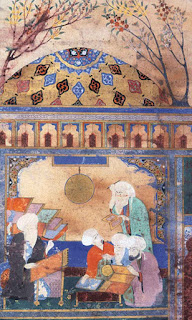Afghan theory of Kingship
 |
Afghan theory of Kingship
|
The Turkish
rulers adopted the theory of kingship which was similar to the theory of Hindu
monarchs. They had faith in divine right theory of kingship and they acted not
only as the representative of God on earth but also believed in absolute
monarchy. They considered the Sultan most powerful on the earth and being a
Naib of God himself he had no kinship with anybody. Every official whether high
or low, was his subordinate and he had fullest control over the activities of the
kingdom. His officials were merely his servants and they were liable to perform
only those duties which were assigned to them by the Sultan. But the theory of
kingship of Afghans had no similarity with this.
The Afghans did
not regard the Sultan superior to his subjects, rather they considered him
first among equals. The theory of divine right of kingship was absolutely
discarded by them. The nobles of Afghan rulers equally participated in affairs
of the state. Akhund Darweza has remarked in this context, “Afghans had since
ancient times never considered it proper to have a king, as their pride and
arrogance would not left them bow and prostrate before one of their own birth
and kin.” On the basis of the principle of equality maintained by the Afghans we
can very well call their reign an oligarchy.
The following
were the fundamental characteristics of the theory of kingship of Afghans.
1. The Afghans had
no faith in the nomination of the future Sultan. They wished that the Sultan
should be elected by the nobility.
2. Every Afghan
Amir considered himself the commander of his army and refused to accept his
army as a part of the royal forces.
3. The Sultan was
not considered a man of privilege by the Afghans. They wished to claim for
themselves all those privileges which were being enjoyed by the sultan.
Hence every
Afghan Amir and noble maintained as independent army, claimed Jagirs and
enjoyed the same privileges as were being enjoyed by the sultan himself.
Bahlol Lodi
founded the Afghan Rule in Delhi Sultanate. The Afghan nobles accepted him to
be their leader. He strictly acted according to Afghan theory of kingship and
always considered himself equal to his nobles. He never sat on the throne in
presence of his Afghan nobles and considering himself first among equals always
sat on the carpet with his nobles. He often visited his nobles in case they
were displeased, sick or having any problem. His food was supplied by the
nobles turnwise and someone of them provided a horse to him if he wished to
ride. He once said, “It is enough if my name is associated with the kingdom.”
He had a few hopes and aspirations, therefore, he successfully acted in
accordance with the Afghan theory of kingship.
Thus so long as
the rulers of Lodi dynasty acted in accordance with the Afghan theory of kingship,
they continued to rule successfully but as soon as they tried to be absolute
monarchs and discarded their theory, they were dethroned and the reign of
Afghans was abolished by a foreigner who came from a distance land like Kabul.
Had Ibrahim acted wisely, he would not have met his doom so early.

0 टिप्पणियाँ:
एक टिप्पणी भेजें
THANKS FOR YOUR COMMENTS
टिप्पणी: केवल इस ब्लॉग का सदस्य टिप्पणी भेज सकता है.